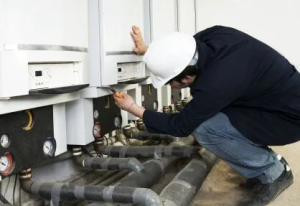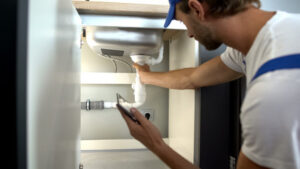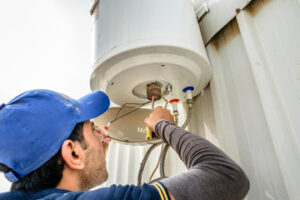There are a lot of noble professions out there, but none more so than plumbing. After all, without plumbers, we wouldn’t be able to take a hot shower or fill our baths with clean and safe water.
Most plumbers get trained on the job, meaning they forgo hefty tuition fees and start earning immediately. They also need a range of skills to carry out their work effectively. Contact Plumbers Aurora CO now!

The plumbing system in homes and businesses takes away waste water, supplies freshwater, and regulates indoor climate through pipes, valves, and fixtures. Plumbers install these systems, as well as repair and maintain them. They work with a wide range of materials, including copper, PVC, ABS, and galvanized steel. Plumbers must have good mechanical skills and be physically strong to handle installation jobs, which may involve cutting pipe or lifting heavy objects. They also must be comfortable working in small spaces.
Plumbers often collaborate with other professionals on building projects to ensure plumbing systems are integrated seamlessly into design plans and meet all necessary regulations and standards. They also may be responsible for educating clients on how to use plumbing fixtures and appliances properly. For example, a plumber might instruct a client on how to operate a new dishwasher or explain the benefits of installing a tankless water heater.
Residential plumbers typically install and repair faucets, toilets, tubs, showers, sinks, and other fixtures. They also might inspect and test sewer lines for backups and leaks, as well as clean drainlines to prevent clogs. These professionals may also install garbage disposals and whole-house water filtration systems.
Commercial and industrial plumbers work with larger-scale plumbing systems in buildings like factories, warehouses, and power plants. These plumbers may be involved in the installation, maintenance, and repair of water supply lines, drainage systems, and fire sprinklers. Industrial plumbers may also work with specialized equipment like boilers and cooling systems.
Some plumbers choose to run their own plumbing business instead of working for an employer. This allows them to have more control over their schedules and choose which projects they want to take on. It also gives them the opportunity to earn higher wages. However, running a plumbing business can be more stressful than working for an employer, as plumbers are generally on-call for emergency repairs 24/7. They also have to invest in tools and other resources to manage their business. It’s important for plumbers to weigh the pros and cons of this career path before making a decision.
Maintenance
Plumbing systems are complex and intricate, but they’re essential to the comfort and safety of occupants. Plumbers install, repair, and maintain these systems to ensure they function properly. They work on pipes, fixtures, and appliances like sinks, toilets, showers, and water heaters. They also inspect and test plumbing components to identify issues and ensure compliance with local building codes. Plumbers may specialize in residential or commercial plumbing, or they may focus on specific types of fixtures or systems.
When it comes to maintaining plumbing systems, plumbers must have strong problem-solving skills to identify and resolve issues. This can include locating and repairing leaks, unclogging drains, and fixing broken or malfunctioning appliances. They must be able to read and interpret blueprints and technical drawings to understand the intricacies of plumbing infrastructure. Additionally, plumbers must be able to work safely in high or tight spaces and with tools that require careful handling.
One of the most important tasks is responding to emergency calls. This involves visiting homes and businesses to fix leaks, clogs, or other urgent problems. This work can be challenging because it requires flexibility in scheduling and a willingness to work outside of regular business hours. It’s also important for plumbers to maintain good communication with customers to ensure they understand the nature of the problem and any potential solutions.
Plumbers often collaborate with other professionals to complete construction projects. For example, they may work with architects and construction teams to ensure plumbing systems are seamlessly integrated into new buildings. They also help clients choose plumbing fixtures and materials, and they may provide cost estimates for plumbing projects.
Plumbing maintenance services can be useful for homeowners and businesses to keep their pipes, fixtures, and appliances in good condition. These services can also prevent costly repairs down the line. For instance, a plumber can check for leaks or corrosion, and they can also use specialized equipment to identify other issues like low water pressure or temperature fluctuations. In addition, they can recommend products and solutions to improve the efficiency of plumbing systems. This helps save energy and money and makes properties more comfortable for occupants.
Repair
Plumbing repair services are offered by plumbers to fix problems that arise in homes or businesses. These problems can be minor, such as leaky faucets or toilets, or major, such as sewer line damage. Plumbers have the tools and training to diagnose and repair these issues quickly and efficiently.
Some plumbing repairs can be done by homeowners themselves, but for more complex problems, it is best to call in a professional plumber. These professionals have the experience and knowledge to ensure that the problem is fixed correctly, the first time around. Homeowners who attempt to fix their own plumbing problems may cause further damage or make the original issue worse.
Professional plumbing repair services can include fixing leaky faucets, toilets, showers, and bathtubs. They can also replace water heaters and clogged drains. In some cases, plumbers can even reroute pipes to improve drainage and prevent flooding.
One of the most important plumbing repair services is sewer line repair. Leaking or damaged sewer lines can lead to serious problems, including property damage, health hazards, and flooding. Plumbers who specialize in this service use advanced tools to diagnose and repair sewer line damage. They can even perform trenchless sewer line repair to minimize disruption to the homeowner’s property.
Another common plumbing repair service is replacing old or worn-out pipes. Plumbers can install new, more durable pipes that will last longer than older, less-durable pipes. They can also install backflow prevention devices to protect against contaminants in the water supply.
Finally, many homeowners hire plumbers to repair or replace kitchen and bathroom fixtures. These professionals have the skills and tools to install sinks, tubs, faucets, and other fixtures. They can also update outdated fixtures to create a more modern look. In addition, these professionals can replace or repair garbage disposals and install new dishwashers.
Sales
As a tradesman, plumbers are responsible for installing and repairing pipes and fixtures in residential, commercial, and industrial settings. Many also work with gas lines and other specialized equipment. They are trained to identify problems and provide solutions, making them a valuable asset to any business. They often work evenings and weekends, requiring a flexible approach to their schedule.
The best plumbers are experts in their field and have a passion for customer service. They are able to communicate effectively and work well in tight spaces. They also understand the importance of keeping up with industry practices and regulations. As a result, they are able to stay on top of new technologies and techniques that can improve their effectiveness in the workplace.
Plumbing professionals are often in high demand and can expect competitive pay. They can also choose to start their own businesses and maximise their earnings potential. Some plumbers may also choose to join an apprenticeship program, which offers on-the-job training and classroom instruction. Apprenticeship programs usually last four years and are a great option for those who want to gain experience in the field before pursuing further education or certifications.
Unlike most industries, the majority of plumbing sales come from inbound leads. Customers typically search for plumbers near them and call the first company that displays their contact information online. For this reason, it’s important for plumbers to have marketing strategies in place that ensure they are positioned at the top of online searches.
For instance, many companies have dispatchers on staff who can respond to customer inquiries via phone or online chat. This helps to build trust with the client and make it easier for them to reschedule appointments when needed. Some businesses even offer text messaging for customers to contact their team.
In addition to marketing, it’s also important for plumbers to focus on building long-term relationships with clients. This can be done by encouraging a collaborative mindset and by creating a culture of transparency and empathy. By fostering these partnerships, plumbers can increase their plumbing sales without having to push hard for quotas or sales benchmarks.


